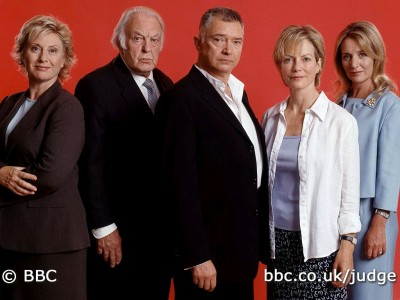| Reviews & Columns |
|
Reviews DVD TV on DVD Blu-ray 4K UHD International DVDs In Theaters Reviews by Studio Video Games Features Collector Series DVDs Easter Egg Database Interviews DVD Talk Radio Feature Articles Columns Anime Talk DVD Savant Horror DVDs The M.O.D. Squad Art House HD Talk Silent DVD
|
DVD Talk Forum |
|
|
| Resources |
|
DVD Price Search Customer Service #'s RCE Info Links |
|
Columns
|
|
|
Judge John Deed - Season Six
How and why Judge John Deed ended so ignominiously isn't entirely clear. The fifth season was rocked by unpardonable censorship by the BBC, including the outright banning of its last few episodes, shows officially unseen since their initial airing. Further, Shaw and co-star Jenny Seagrove (Local Hero) apparently were unhappy with the format change made for season six: instead of four-to-six 90-minute, self-contained episodes accompanied by a broader, season-long story arc, season six consists of four two-part stories, each episode running just shy of 60 minutes.
The two stories/four episodes format that make up Judge John Deed - Season Six is a mixed bag. The first story is ambitious but dramatically prolix and occasionally ridiculous and while the second is interesting and highly satisfying, to some extent it falls back on the show's familiar dramatic clichés. Nonetheless, it's a reasonably fitting end for one of Britain's better continuing series.
For the uninitiated, Judge John Deed (Martin Shaw) is a liberal fantasy, a champion of the oppressed, especially victims of corporate greed. This is in sharp contrast to conservative establishment judges, a politically-motivated Lord Chancellor's Department (the ultimate Old Boy Network), and the Home Office. Creator G.F. Newman's teleplays always grapple with interesting points of law, and he's not afraid to take chances with topical, controversial and complex issues.
Deed is something of a rake, a womanizer whose disloyalty and lack of commitment to sometime lover Jo Mills (Seagrove), a former pupil turned QC (Queen's Counsel) and, by this point, politically radical private advocate, had over the seasons degenerated into trite soap opera. When it began Shaw was a handsome and fit 56, but by 2007, at 62, his unsubtle advances toward women half his age cross over into "dirty old man" territory. In a way, season six's shows sort of address this, as some of the women lining up to seduce Deed do so to exploit this basic weakness of character, rather than for reasons of mutual attraction.
The first storyline, "War Crimes," removes him from his familiar surroundings, with Deed sent to the Hague as Britain's representative in an International Criminal Court trial concerning a British soldier accused of murdering 11 innocent civilians in Iraq. The soldier is regarded as a sacrificial lamb by the British government, part of a larger exit strategy (designed to save more lives in the long run). But, predictably, Deed gums up their best-laid plans by insisting on an investigation of the soldier's mental state.
"War Crimes" is an odd two-parter, ambitious in its directness in accusing Britain of willfully abandoning its soldiers and subjecting Iraqis to even worse, while at the same time incorporating absurdly unbelievable concepts, like Deed's passionate affair with the very Muslim terrorist sent to assassinate him. And beyond Deed's ongoing affair with Jo, here representing the solder, the glamorous prosecuting attorney (perennial seducer Kim Thomson) also tries to seduce him. It's so over-the-top Thomson's scenes especially recall her seduction of Jeff Goldblum in The Tall Guy. And that was intentionally funny.
"Evidence of Harm" is somewhat better, though it falls back on the usual hissible corporate and government villains who all but twirl sinister mustaches and sport black capes and top hats. In this story Deed hears the case of a widow whose soldier husband committed suicide (killing their small son in the process), allegedly caused by a cocktail of vaccines given him while in the military, and intended to counteract biological weapons.
This notably cynical episode condemns profit-driven pharmaceutical companies and their unethical ties to all branches of government, and their willingness to commit felonies to protect their considerable assets. It also disturbingly explores spying technologies making true personal privacy all but impossible today.
Unlike the fish-out-of-water first storyline, "Evidence of Harm" also gives other characters on the show, notably Deed's ex-father-in-law, High Court Judge Sir Joseph Channing (Donald Sinden), Deed's daughter, Charlie (Louisa Clein), and clerk "Coop" (Barbara Thorn) much more to do. It's not a bad final episode, even if it wasn't intended as such.
Video & Audio
The four hour-length episodes in 16:9 enhanced widescreen are spread over two single-sided discs. The shows were apparently shot in HD but they have a filmed look about them, and look quite nice here. The Dolby Digital stereo is very good also, and optional English subtitles are included for the deaf and hearing impaired. There are no Extra Features.
Parting Thoughts
Judge John Deed is a show of contrasts. On one hand it's timely and intelligent, impressively and directly delving into real world problems with complex legal issues at stake. On the other it all too often falls back on dramatic crutches, with absurdly soapy romantic entanglements, while pitting its title character against unsubtle, Snidely Whiplash-like villains. But its qualities ultimately outweigh its weaknesses and the program is Highly Recommended.
Stuart Galbraith IV is a Kyoto-based film historian whose work includes film history books, DVD and Blu-ray audio commentaries and special features. Visit Stuart's Cine Blogarama here.
|
| Popular Reviews |
| Sponsored Links |
|
|
| Sponsored Links |
|
|
| Release List | Reviews | Shop | Newsletter | Forum | DVD Giveaways | Blu-Ray | Advertise |
|
Copyright 2024 DVDTalk.com All Rights Reserved. Legal Info, Privacy Policy, Terms of Use,
Manage Preferences,
Your Privacy Choices | |||||||















